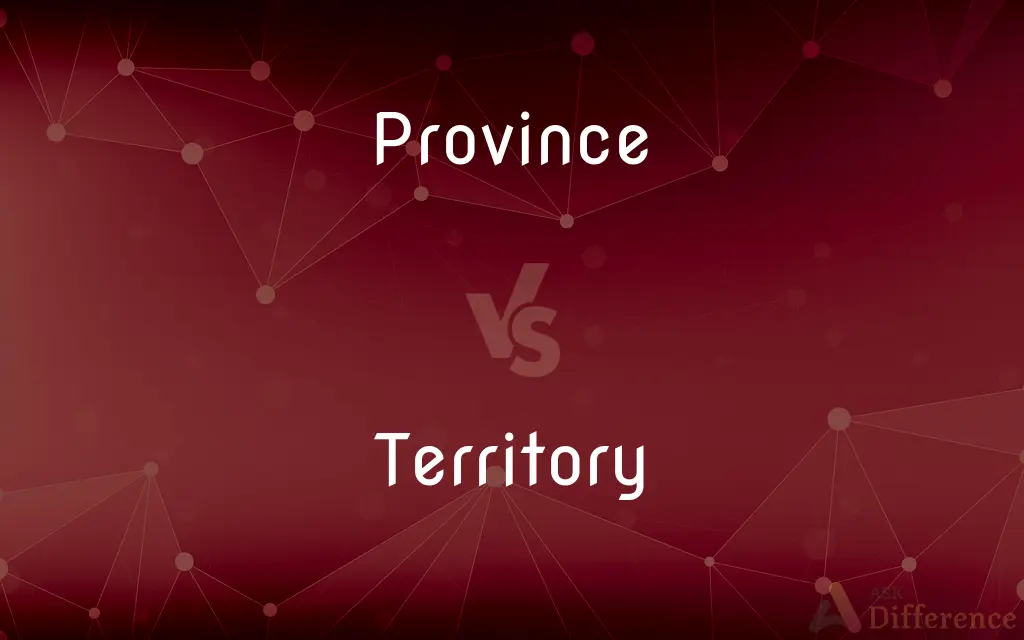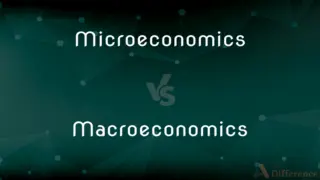Province vs. Territory — What's the Difference?
By Tayyaba Rehman & Fiza Rafique — Updated on March 20, 2024
A province is an administrative division within a country, often with its own local government, while a territory is a region governed directly by the national government, typically with less autonomy.

Difference Between Province and Territory
Table of Contents
ADVERTISEMENT
Key Differences
Provinces are key administrative units within a country, each with a degree of self-governance and legislative power granted by the national or federal constitution. They typically have a defined geographic boundary and are empowered to manage their own affairs, including education, healthcare, and transportation. On the other hand, territories are regions that may not have the full rights of self-government and are often governed to a significant extent by the national government. Territories can be on the path to becoming provinces or states, have strategic importance, or exist in areas with smaller populations.
The distinction between provinces and territories mainly lies in their level of autonomy and the manner of governance. Provinces usually enjoy a higher degree of self-governance and have their legislative assemblies, whereas territories might have limited self-governance and may be subject to more direct control by the national government. This difference is often due to historical, geographical, or political reasons.
In terms of representation, provinces typically have guaranteed representation in the national legislative bodies and may have a significant say in national affairs. Territories, while they may have representation, often have less influence in national legislative processes and might have representatives with limited voting rights.
The process of law-making and the authority to enact legislation can also differ significantly. Provinces often have the power to make laws in a wide range of areas, reflecting their more autonomous status. Territories, by contrast, might have restrictions on the types of laws they can enact, with the national government retaining more legislative powers over these regions.
Economically and culturally, provinces often have distinct identities, economies, and cultural practices, which are recognized and preserved under the country's constitution. Territories, while also having unique cultural and economic aspects, may rely more heavily on national support and governance to manage their affairs and development.
ADVERTISEMENT
Comparison Chart
Autonomy
High degree of self-governance and legislative powers.
Limited self-governance, more direct control by national government.
Governance
Has its own local government with significant powers.
Governed more directly by the national government.
Legislative Authority
Broad authority to make laws across a wide range of areas.
May have restricted legislative powers.
Representation
Guaranteed representation in national legislative bodies.
May have representation, often with limited powers.
Economic and Cultural Identity
Distinct identities, economies, and cultural practices.
May have unique aspects but relies more on national support.
Compare with Definitions
Province
Often has a unique cultural identity.
The province is celebrated for its unique festivals and traditions.
Territory
Often holds strategic or special significance.
The territory's location makes it key to national security.
Province
Manages its own affairs in many areas.
Each province sets its own educational curriculum.
Territory
Relies on national support for development.
The territory benefits from national cultural and economic programs.
Province
Has its legislative assembly and government.
The provincial government passed new healthcare reforms.
Territory
A region under the direct authority of the national government.
The territory is crucial for the country's defense strategy.
Province
A primary territorial unit within a country.
The province of Alberta is known for its natural beauty and oil reserves.
Territory
Has less self-governance than provinces.
The national government oversees the territory's major policies.
Province
Plays a specific role in the country's economy.
The province contributes significantly to the national economy through agriculture.
Territory
May be in the process of becoming a full-fledged province or state.
The territory is seeking more autonomy and eventually statehood.
Province
A province is almost always an administrative division within a country or state. The term derives from the ancient Roman provincia, which was the major territorial and administrative unit of the Roman Empire's territorial possessions outside Italy.
Territory
A territory is an administrative division, usually an area that is under the jurisdiction of a sovereign state. In most countries, a territory is an organized division of an area that is controlled by a country but is not formally developed into, or incorporated into, a political unit of the country that is of equal status to other political units that may often be referred to by words such as "provinces" or "regions" or "states".
Province
A principal administrative division of a country or empire
Chengdu, capital of Sichuan province
Territory
An area of land; a region.
Province
The whole of a country outside the capital, especially when regarded as lacking in sophistication or culture
I made my way home to the dreary provinces by train
Territory
The land and waters under the jurisdiction of a government.
Province
An area of special knowledge, interest, or responsibility
She knew little about wine—that had been her father's province
Territory
A political subdivision of a country.
Province
A territory governed as an administrative or political unit of a country or empire.
Territory
A geographic region, such as a colonial possession, that is dependent on an external government
The territories of the Holy Roman Empire.
Province
(Ecclesiastical) A division of territory under the jurisdiction of a metropolitan.
Territory
A subdivision of the United States that is not a state and is administered by an appointed or elected governor and elected legislature.
Province
Provinces Areas of a country situated away from the capital or population center.
Territory
A similarly organized political subdivision of Canada or Australia.
Province
An area of knowledge, activity, or interest
A topic falling within the province of ancient history.
Territory
An area for which a person is responsible as a representative or agent
A salesperson's territory.
Province
The range of one's proper duties and functions; scope.
Territory
(Sports)The area of a field defended by a specified team
Punted the ball deep into the opponent's territory.
Province
(Ecology) An area of land, less extensive than a region, having a characteristic plant and animal population.
Territory
(Biology)An area occupied by a single animal, mating pair, or group and often vigorously defended against intruders, especially those of the same species.
Province
Any of various lands outside Italy conquered by the Romans and administered by them as self-contained units.
Territory
A sphere of action or interest; a province.
Province
A region of the earth or of a continent; a district or country.
Territory
A large extent or tract of land; for example a region, country or district.
Province
An administrative subdivision of certain countries, including Canada and China.
Territory
(Canada) One of three of Canada's federated entities, located in the country's Arctic, with fewer powers than a province and created by an act of Parliament rather than by the Constitution: Yukon, Northwest Territories, and Nunavut.
Province
(Roman history) An area outside Italy which is administered by a Roman governor.
Territory
(Australia) One of three of Australia's federated entities, located in the country's north and southeast, with fewer powers than a state and created by an act of Parliament rather than by the Constitution: Northern Territory, Australian Capital Territory and Jervis Bay Territory.
Province
(Christianity) An area under the jurisdiction of an archbishop, typically comprising a number of adjacent dioceses.
Territory
A geographic area under control of a single governing entity such as state or municipality; an area whose borders are determined by the scope of political power rather than solely by natural features such as rivers and ridges.
Province
(Roman Catholicism) An area under the jurisdiction of a provincial within a monastic order.
Territory
(ecology) An area that an animal of a particular species consistently defends against its conspecifics.
Province
The parts of a country outside its capital city.
Territory
The part of the playing field or board over which a player or team has control.
Province
An area of activity, responsibility or knowledge; the proper concern of a particular person or concept.
Territory
A geographic area that a person or organization is responsible for in the course of work.
Province
A country or region, more or less remote from the city of Rome, brought under the Roman government; a conquered country beyond the limits of Italy.
Territory
A location or logical space which someone owns or controls.
Province
A country or region dependent on a distant authority; a portion of an empire or state, esp. one remote from the capital.
Territory
A market segment or scope of professional practice over which an organization or type of practitioner has exclusive rights.
Province
A region of country; a tract; a district.
Over many a tractof heaven they marched, and many a province wide.
Other provinces of the intellectual world.
Territory
An area of subject matter, knowledge, or experience.
Province
A region under the supervision or direction of any special person; the district or division of a country, especially an ecclesiastical division, over which one has jurisdiction; as, the province of Canterbury, or that in which the archbishop of Canterbury exercises ecclesiastical authority.
Territory
A large extent or tract of land; a region; a country; a district.
He looked, and saw wide territory spreadBefore him - towns, and rural works between.
Province
The proper or appropriate business or duty of a person or body; office; charge; jurisdiction; sphere.
The woman'sprovince is to be careful in her economy, and chaste in her affection.
Territory
The extent of land belonging to, or under the dominion of, a prince, state, or other form of government; often, a tract of land lying at a distance from the parent country or from the seat of government; as, the territory of a State; the territories of the East India Company.
Province
Specif.: Any political division of the Dominion of Canada, having a governor, a local legislature, and representation in the Dominion parliament. Hence, colloquially, The Provinces, the Dominion of Canada.
Territory
In the United States, a portion of the country not included within the limits of any State, and not yet admitted as a State into the Union, but organized with a separate legislature, under a Territorial governor and other officers appointed by the President and Senate of the United States. In Canada, a similarly organized portion of the country not yet formed into a Province.
Province
The territory occupied by one of the constituent administrative districts of a nation;
His state is in the deep south
Territory
A region marked off for administrative or other purposes
Province
The proper sphere or extent of your activities;
It was his province to take care of himself
Territory
An area of knowledge or interest;
His questions covered a lot of territory
Territory
The geographical area under the jurisdiction of a sovereign state;
American troops were stationed on Japanese soil
Common Curiosities
What determines if an area is a province or a territory?
Factors include historical agreements, population size, strategic importance, and the region's readiness for self-governance.
Can a territory become a province?
Yes, territories can become provinces or states through a process defined by the national government, often involving legislation and sometimes a referendum.
Do territories always have less autonomy than provinces?
Generally, yes, but the degree of autonomy can vary widely among territories and is subject to change over time.
How does the governance structure differ between provinces and territories?
Provinces typically have their own constitutions and governments with a broad range of powers, while territories are more directly governed by the national government and may have more limited powers.
Are there economic differences between provinces and territories?
Yes, provinces often have more developed economies and greater economic independence, while territories may rely more on national investment and subsidies.
How do provinces and territories contribute to the national culture?
Both contribute to the national mosaic through their unique cultural practices, traditions, and histories, enriching the overall diversity of the country.
How do people in territories advocate for more rights or autonomy?
Advocacy can take many forms, including lobbying, legal challenges, and negotiating with the national government for greater self-governance or statehood.
What role do provinces and territories play in national defense?
While the national government typically oversees defense, the strategic location of certain provinces or territories can make them key to national security strategies.
Can laws passed in a province contradict national laws?
Generally, national laws take precedence, but provinces have significant leeway to enact laws in areas not reserved for the national government.
What impact does the status of province or territory have on residents' daily lives?
The level of local governance, access to services, and the degree of representation at the national level can all impact the quality of life and civic participation of residents.
Share Your Discovery

Previous Comparison
Microeconomics vs. Macroeconomics
Next Comparison
Hole vs. TrenchAuthor Spotlight
Written by
Tayyaba RehmanTayyaba Rehman is a distinguished writer, currently serving as a primary contributor to askdifference.com. As a researcher in semantics and etymology, Tayyaba's passion for the complexity of languages and their distinctions has found a perfect home on the platform. Tayyaba delves into the intricacies of language, distinguishing between commonly confused words and phrases, thereby providing clarity for readers worldwide.
Co-written by
Fiza RafiqueFiza Rafique is a skilled content writer at AskDifference.com, where she meticulously refines and enhances written pieces. Drawing from her vast editorial expertise, Fiza ensures clarity, accuracy, and precision in every article. Passionate about language, she continually seeks to elevate the quality of content for readers worldwide.














































